Rearranging deck chairs on the Titanic: Belgium’s latest move doesn’t solve critical issues with EU CSA Regulation
The EDRi network has long-urged European Union (EU) lawmakers to ensure that efforts to combat OCSEA (online child sexual exploitation and abuse) are lawful, effective and technically feasible. The goal to protect children online is vital. This can only be done if the proposed measures work and are compatible with human rights, including privacy and the presumption of innocence.
Filter resources
-
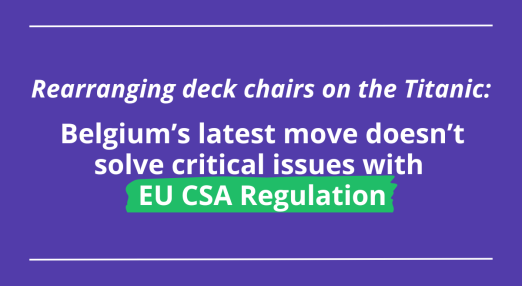
Rearranging deck chairs on the Titanic: Belgium’s latest move doesn’t solve critical issues with EU CSA Regulation
The EDRi network has long-urged European Union (EU) lawmakers to ensure that efforts to combat OCSEA (online child sexual exploitation and abuse) are lawful, effective and technically feasible. The goal to protect children online is vital. This can only be done if the proposed measures work and are compatible with human rights, including privacy and the presumption of innocence.
Read more
-

2023 Digital Rights Update: Eastern Partnership CSO Meter
Countries of the Eastern Partnership region continue digitalisation efforts and some implemented promising data protection legislation. However, the expansion of surveillance and spread of disinformation put digital rights under constant pressure in 2023.
Read more
-

Mandatory fingerprints on IDs will be up for re-negotiation
On 21 March 2024, the European Court of Justice ruled the European Union (EU) regulation that enacts fingerprint IDs to be invalid for formal reasons. The principle of mandatory fingerprint collection was declared to be compliant with fundamental rights. However, the court has required a new regulation to be adopted on a different legal basis, opening up opportunities to ultimately overturn the fingerprint obligation.
Read more
-
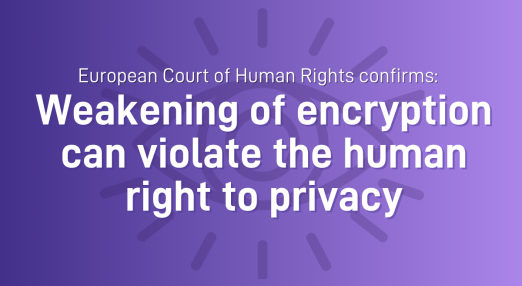
European Court of Human Rights confirms: weakening of encryption can violate the human right to privacy
In a milestone judgment - Podchasov v. Russia - the European Court of Human Rights (ECtHR) has ruled that weakening of encryption can lead to general and indiscriminate surveillance of the communications of all users and violates the human right to privacy.
Read more
-

Will the Brussels spyware scandal finally convince the EU to act?
In February, Brussels was rocked by reports of phone hacking and spyware attacks on members of the European Parliament’s defence and security committee. Such intrusions are a huge threat to EU democracy — interfering with decision-making and allowing obstructive disruptions to public debate. Three weeks on, nothing seems to have changed with the EU’s approach to spyware.
Read more
-
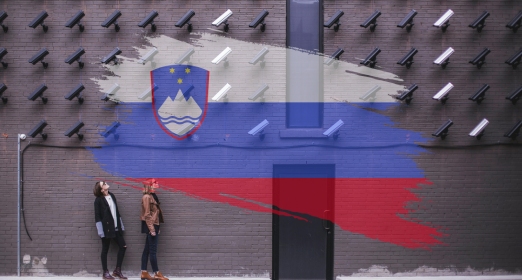
Privatised municipal surveillance on the stage of security theatre in Slovenia
The municipality of Ljubljana, the capital of Slovenia, wasted almost two years deflecting freedom of information requests (FOIAs) from EDRi member Državljan Dsfor the municipal CCTV system data in the city. The data, when finally provided, revealed the scale of ineffective security theatre paid for by Ljubljana’s citizens, and the need for a public debate about the use of this technology.
Read more
-

Press Release: Brussels rocked by major spyware scandal: Urgent call for ban
Now, when push has come to shove, policymakers at the European Union (EU) must act to ban spyware in Europe. Yesterday, the media reported a major attack on EU democracy with members of the European Parliament Defense Committee being the target of phone hacking.
Read more
-

When law enforcement undermines our digital safety, who is looking after our interests?
Imagine your friend sent you a private DM on Twitter. Now imagine, instead of the content remaining for your eyes only, Twitter letting the police also take a peek at it. Such intrusive practices of state actors accessing private messages have grave consequences for our lives. Some people can be physically harmed, and for some, it can mean that their families and friends could get prosecuted. At a collective level, the harm this does to our communities and society at large is immeasurable.
Read more
-
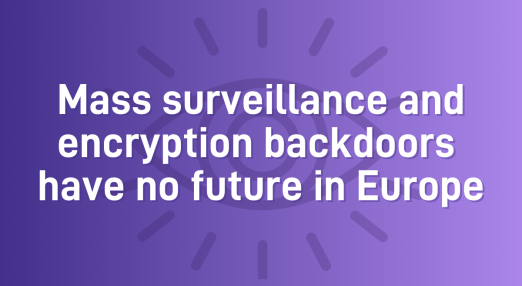
Mass surveillance and encryption backdoors have no future in Europe
Today, 20 February, in a public consultation at the European Commission, the EDRi network calls on EU lawmakers to end all attempts to normalise dangerous surveillance practices that rip people off their safety and privacy online.
Read more
-
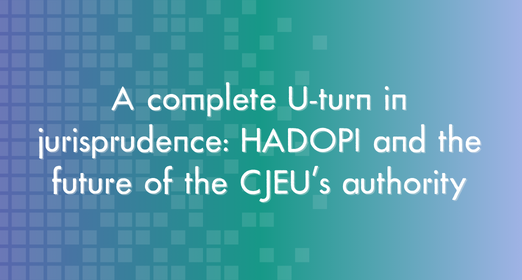
A complete U-turn in jurisprudence: HADOPI and the future of the Court of Justice of the European Union’s authority
This blog post argues that, if followed by the Court, the interpretation proposed by the AG would lead to a severe weakening of the CJEU’s authority and legitimacy, more generally. This would be of great symbolic significance in an already challenging environment for the Court which is faced with increasing defiance of Member States in the field of data protection.
Read more
-
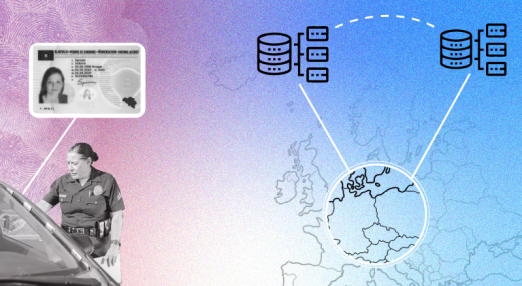
Automated data exchange in Prüm II: The EU’s securitisation mindset keeps encroaching on our fundamental rights
The agreement on automated data exchange for police cooperation, known as ‘Prüm II aligns with a broader EU trend of laws prioritising national security over human rights. The final text of this regulation has insufficient fundamental rights safeguards and could even encourage more member states to adopt facial recognition technology. The EU Parliament must reject the current Prüm II Regulation in the upcoming plenary vote.
Read more
-

Irish Media Regulator must address dangerous age verification in its new online safety code
On 30 January 2024, EDRi submitted its comments on the Irish Media Regulator’s (Coimisiún na Meán) new Online Safety Code in a public consultation, highlighting significant concerns about age verification.
Read more
